江西南昌二中高三英语第四次月考试题
江西省南昌市第二中学高三英语上学期第四次月考试题(含解析)
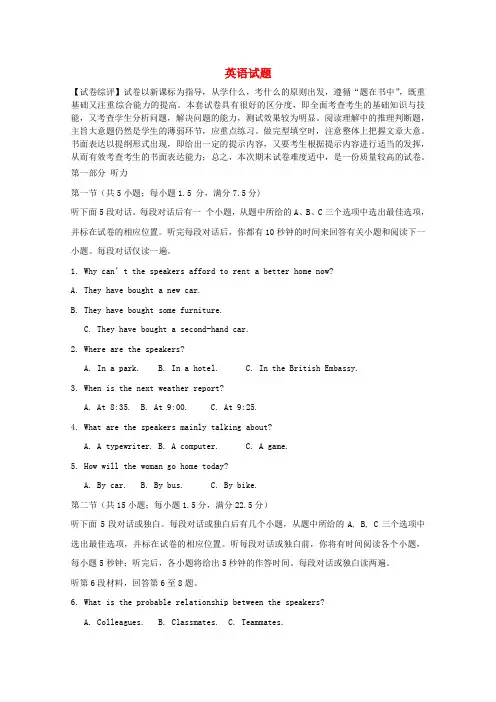
英语试题【试卷综评】试卷以新课标为指导,从学什么,考什么的原则出发,遵循“题在书中”,既重基础又注重综合能力的提高。
本套试卷具有很好的区分度,即全面考查考生的基础知识与技能,又考查学生分析问题,解决问题的能力,测试效果较为明显。
阅读理解中的推理判断题,主旨大意题仍然是学生的薄弱环节,应重点练习。
做完型填空时,注意整体上把握文章大意。
书面表达以提纲形式出现,即给出一定的提示内容,又要考生根据提示内容进行适当的发挥,从而有效考查考生的书面表达能力;总之,本次期末试卷难度适中,是一份质量较高的试卷。
第一部分听力第一节(共5小题;每小题1.5 分,满分7.5分)听下面5段对话。
每段对话后有一个小题,从题中所给的A、B、C三个选项中选出最佳选项,并标在试卷的相应位置。
听完每段对话后,你都有10秒钟的时间来回答有关小题和阅读下一小题。
每段对话仅读一遍。
1. Why can’t the speakers afford to rent a better home now?A. They have bought a new car.B. They have bought some furniture.C. They have bought a second-hand car.2. Where are the speakers?A. In a park.B. In a hotel.C. In the British Embassy.3. When is the next weather report?A. At 8:35.B. At 9:00.C. At 9:25.4. What are the speakers mainly talking about?A. A typewriter.B. A computer.C. A game.5. How will the woman go home today?A. By car.B. By bus.C. By bike.第二节(共15小题;每小题1.5分,满分22.5分)听下面5段对话或独白。
江西省南昌市第二中学2020┄2021届高三上学期第四次考试 英语试题
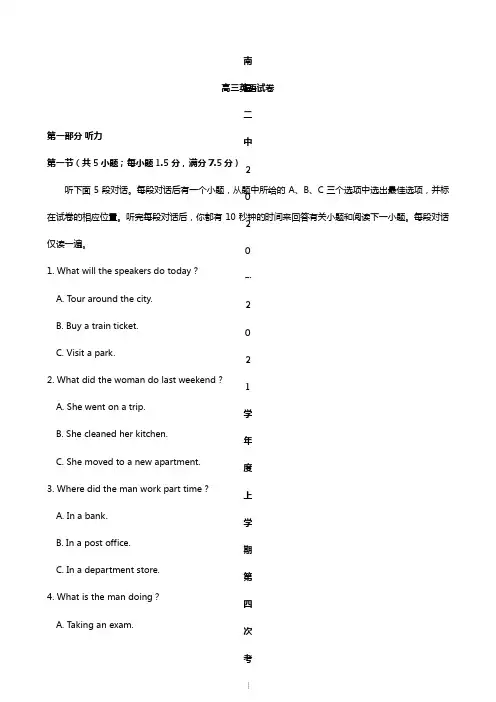
南昌二中2020┄2021学年度上学期第四次考高三英语试卷第一部分 听力 第一节(共5小题;每小题1.5 分,满分7.5分)听下面5段对话。
每段对话后有一个小题,从题中所给的A 、B 、C 三个选项中选出最佳选项,并标在试卷的相应位置。
听完每段对话后,你都有10秒钟的时间来回答有关小题和阅读下一小题。
每段对话仅读一遍。
1. What will the speakers do today ?A. T our around the city.B. Buy a train ticket.C. Visit a park.2. What did the woman do last weekend ?A. She went on a trip.B. She cleaned her kitchen.C. She moved to a new apartment. 3. Where did the man work part time ? A. In a bank. B. In a post office. C. In a department store. 4. What is the man doing ? A. T aking an exam.B. Reading a book.C. Having a class.5. Where does the conversation take place?A. In a library.B. In a concert.C. In a store.第二节听下面 5 段对话。
每段对话后有几个小题,从题中所给的 A、B、C 三个选项中选出最佳选项,并标在试卷的相应位置。
听每段对话前,你将有时间阅读各个小题,每小题 5 秒钟;听完后,各小题将给出 5 秒钟的作答时间。
每段对话读两遍。
听第 6 段材料,回答第 6、7 题。
6. What are the speakers talking about in general?A. The man’s children.B. Their team members.C. A famous athlete.7. What team is Patricia on?A. The swim team.B. The basketball team.C. The dancing team.听第 7 段材料,回答第 8、9 题。
江西南昌二中高三英语第四次月考试卷
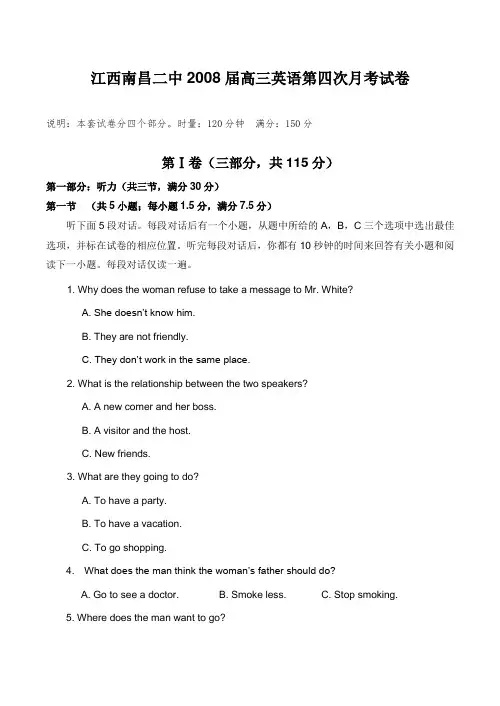
江西南昌二中2008届高三英语第四次月考试卷说明:本套试卷分四个部分。
时量:120分钟满分:150分第Ⅰ卷(三部分,共115分)第一部分:听力(共三节,满分30分)第一节(共5小题;每小题1.5分,满分7.5分)听下面5段对话。
每段对话后有一个小题,从题中所给的A,B,C三个选项中选出最佳选项,并标在试卷的相应位置。
听完每段对话后,你都有10秒钟的时间来回答有关小题和阅读下一小题。
每段对话仅读一遍。
1. Why does the woman refuse to take a message to Mr. White?A. She doesn’t know him.B. They are not friendly.C. They don’t work in the same place.2. What is the relationship between the two speakers?A. A new comer and her boss.B. A visitor and the host.C. New friends.3. What are they going to do?A. To have a party.B. To have a vacation.C. To go shopping.4. What does the man think the woman’s father should do?A. Go to see a doctor.B. Smoke less.C. Stop smoking.5. Where does the man want to go?A. The police station.B. The city library.C. The supermarket.第二节(共15小题;每小题1.5分,满分22.5分)听下面5段对话或独白。
每段对话或独白后有几个小题,从题中所给的A、B、C三个选项中选出最佳选项,并标在试卷的相应位置。
江西省南昌市第二中学2015届高三上学期第四次月考英语
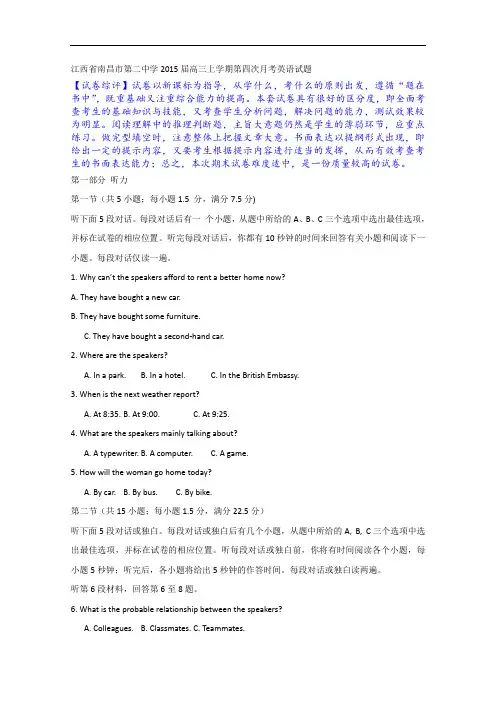
江西省南昌市第二中学2015届高三上学期第四次月考英语试题【试卷综评】试卷以新课标为指导,从学什么,考什么的原则出发,遵循“题在书中”,既重基础又注重综合能力的提高。
本套试卷具有很好的区分度,即全面考查考生的基础知识与技能,又考查学生分析问题,解决问题的能力,测试效果较为明显。
阅读理解中的推理判断题,主旨大意题仍然是学生的薄弱环节,应重点练习。
做完型填空时,注意整体上把握文章大意。
书面表达以提纲形式出现,即给出一定的提示内容,又要考生根据提示内容进行适当的发挥,从而有效考查考生的书面表达能力;总之,本次期末试卷难度适中,是一份质量较高的试卷。
第一部分听力第一节(共5小题;每小题1.5 分,满分7.5分)听下面5段对话。
每段对话后有一个小题,从题中所给的A、B、C三个选项中选出最佳选项,并标在试卷的相应位置。
听完每段对话后,你都有10秒钟的时间来回答有关小题和阅读下一小题。
每段对话仅读一遍。
1. Why can’t the speakers afford to rent a better home now?A. They have bought a new car.B. They have bought some furniture.C. They have bought a second-hand car.2. Where are the speakers?A. In a park.B. In a hotel.C. In the British Embassy.3. When is the next weather report?A. At 8:35.B. At 9:00.C. At 9:25.4. What are the speakers mainly talking about?A. A typewriter.B. A computer.C. A game.5. How will the woman go home today?A. By car.B. By bus.C. By bike.第二节(共15小题;每小题1.5分,满分22.5分)听下面5段对话或独白。
江西省南昌市第二中学2015届高三上第四次月考英语试题及答案
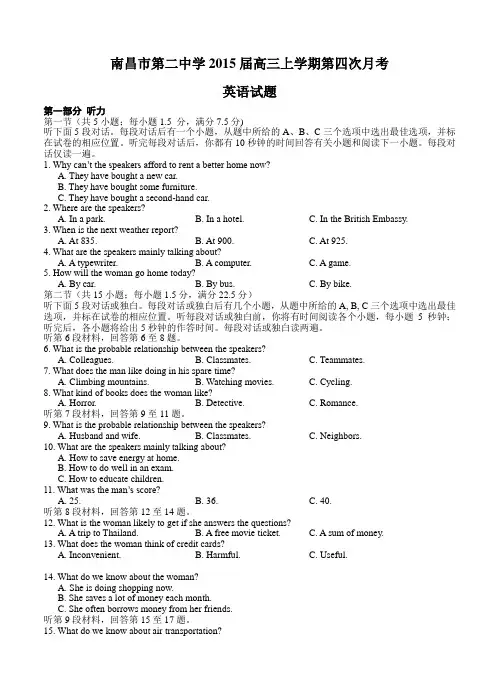
南昌市第二中学2015届高三上学期第四次月考英语试题第一部分听力第一节(共5小题;每小题1.5 分,满分7.5分)听下面5段对话。
每段对话后有一个小题,从题中所给的A、B、C三个选项中选出最佳选项,并标在试卷的相应位置。
听完每段对话后,你都有10秒钟的时间回答有关小题和阅读下一小题。
每段对话仅读一遍。
1. Why can’t the speakers afford to rent a better home now?A. They have bought a new car.B. They have bought some furniture.C. They have bought a second-hand car.2. Where are the speakers?A. In a park.B. In a hotel.C. In the British Embassy.3. When is the next weather report?A. At 835.B. At 900.C. At 925.4. What are the speakers mainly talking about?A. A typewriter.B. A computer.C. A game.5. How will the woman go home today?A. By car.B. By bus.C. By bike.第二节(共15小题;每小题1.5分,满分22.5分)听下面5段对话或独白。
每段对话或独白后有几个小题,从题中所给的A, B, C三个选项中选出最佳选项,并标在试卷的相应位置。
听每段对话或独白前,你将有时间阅读各个小题,每小题5秒钟;听完后,各小题将给出5秒钟的作答时间。
每段对话或独白读两遍。
听第6段材料,回答第6至8题。
6. What is the probable relationship between the speakers?A. Colleagues.B. Classmates.C. Teammates.7. What does the man like doing in his spare time?A. Climbing mountains.B. Watching movies.C. Cycling.8. What kind of books does the woman like?A. Horror.B. Detective.C. Romance.听第7段材料,回答第9至11题。
江西省南昌市第二中学2015届高三英语上学期第四次月考试题
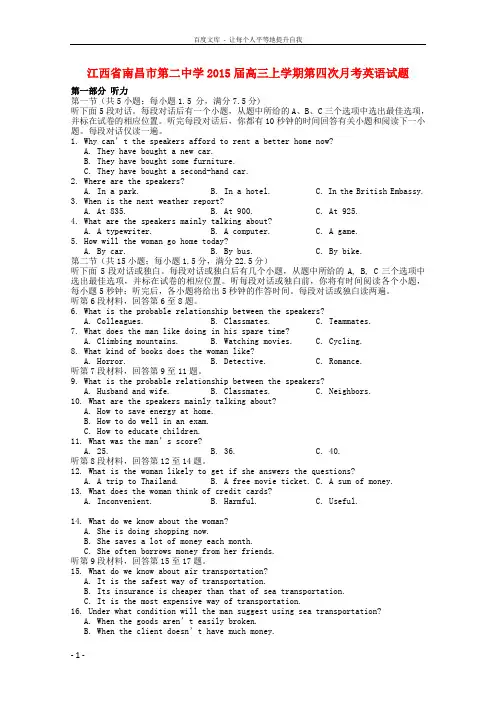
江西省南昌市第二中学2015届高三上学期第四次月考英语试题第一部分听力第一节(共5小题;每小题1.5 分,满分7.5分)听下面5段对话。
每段对话后有一个小题,从题中所给的A、B、C三个选项中选出最佳选项,并标在试卷的相应位置。
听完每段对话后,你都有10秒钟的时间回答有关小题和阅读下一小题。
每段对话仅读一遍。
1. Why can’t the speakers afford to rent a better home now?A. They have bought a new car.B. They have bought some furniture.C. They have bought a second-hand car.2. Where are the speakers?A. In a park.B. In a hotel.C. In the British Embassy.3. When is the next weather report?A. At 835.B. At 900.C. At 925.4. What are the speakers mainly talking about?A. A typewriter.B. A computer.C. A game.5. How will the woman go home today?A. By car.B. By bus.C. By bike.第二节(共15小题;每小题1.5分,满分22.5分)听下面5段对话或独白。
每段对话或独白后有几个小题,从题中所给的A, B, C三个选项中选出最佳选项,并标在试卷的相应位置。
听每段对话或独白前,你将有时间阅读各个小题,每小题5秒钟;听完后,各小题将给出5秒钟的作答时间。
每段对话或独白读两遍。
听第6段材料,回答第6至8题。
6. What is the probable relationship between the speakers?A. Colleagues.B. Classmates.C. Teammates.7. What does the man like doing in his spare time?A. Climbing mountains.B. Watching movies.C. Cycling.8. What kind of books does the woman like?A. Horror.B. Detective.C. Romance.听第7段材料,回答第9至11题。
江西省南昌市第二中学2021届上学期高三年级第四次考试英语试卷
江西省南昌市第二中学2021届上学期高三年级第四次考试英语试卷第一部分听力(共两节,满分30分)第一节共5小题;每小题分,满分分)听下面5段对话。
每段对话后有一个小题,从题中所给的A、B、C三个选项中选出最佳选项。
听完每段对话后,你都有10秒钟的时间来回答有关小题和阅读下一小题。
每段对话仅读一遍。
1 What do we now about the manA He is a smoerB He hates smoingC He lies the manager2 How far is it from Beijing to HandanA About 200 kmB About 300 kmC About 600 km3 What will the s35 mph45 mph55 mphes drierC It gets a shamercial se easily afraid of things In 1917, he was e u49 a53 a55 ine55 A absorbed B interested C confident D confused56 A offer e to China for vacation, during which time you will able to have a taste of our unique “Red Culture”Actually, here in my hometown eists some ideal se to China for vacation, during which timehay hometown eists some ideal s of travelers as its scenic view as well as historical significance With breathtaingforscenery or rich “Red Culture” resources, it is certainly my touseum, which will heluseumsI am sure it will be the wonderful e witha e illions of ay helatters that you love English Interest is the best teacher Once you develoatter how many difficulties occur Then, mae good use of all the materials you can, set a ethods Only whenIn short, English learning is not a short easy journey that needs our continuous hard wor听力原文:第一节听下面5段对话。
江西省南昌市第二中学2015届高三上第四次月考英语试题及答案
南昌市第二中学2015届高三上学期第四次月考英语试题第一部分听力第一节(共5小题;每小题1.5 分,满分7.5分)听下面5段对话。
每段对话后有一个小题,从题中所给的A、B、C三个选项中选出最佳选项,并标在试卷的相应位置。
听完每段对话后,你都有10秒钟的时间回答有关小题和阅读下一小题。
每段对话仅读一遍。
1. Why can’t the speakers afford to rent a better home now?A. They have bought a new car.B. They have bought some furniture.C. They have bought a second-hand car.2. Where are the speakers?A. In a park.B. In a hotel.C. In the British Embassy.3. When is the next weather report?A. At 835.B. At 900.C. At 925.4. What are the speakers mainly talking about?A. A typewriter.B. A computer.C. A game.5. How will the woman go home today?A. By car.B. By bus.C. By bike.第二节(共15小题;每小题1.5分,满分22.5分)听下面5段对话或独白。
每段对话或独白后有几个小题,从题中所给的A, B, C三个选项中选出最佳选项,并标在试卷的相应位置。
听每段对话或独白前,你将有时间阅读各个小题,每小题5秒钟;听完后,各小题将给出5秒钟的作答时间。
每段对话或独白读两遍。
听第6段材料,回答第6至8题。
6. What is the probable relationship between the speakers?A. Colleagues.B. Classmates.C. Teammates.7. What does the man like doing in his spare time?A. Climbing mountains.B. Watching movies.C. Cycling.8. What kind of books does the woman like?A. Horror.B. Detective.C. Romance.听第7段材料,回答第9至11题。
江西省南昌市第二中学2015届高三上学期第四次月考英语试卷
第一部分听力第一节(共5小题;每小题1.5 分,满分7.5分)听下面5段对话。
每段对话后有一个小题,从题中所给的A、B、C三个选项中选出最佳选项,并标在试卷的相应位置。
听完每段对话后,你都有10秒钟的时间来回答有关小题和阅读下一小题。
每段对话仅读一遍。
1. Why can’t the speakers afford to rent a better home now?A. They have bought a new car.B. They have bought some furniture.C. They have bought a second-hand car.2. Where are the speakers?A. In a park.B. In a hotel.C. In the British Embassy.3. When is the next weather report?A. At 8:35.B. At 9:00.C. At 9:25.4. What are the speakers mainly talking about?A. A typewriter.B. A computer.C. A game.5. How will the woman go home today?A. By car.B. By bus.C. By bike.第二节(共15小题;每小题1.5分,满分22.5分)听下面5段对话或独白。
每段对话或独白后有几个小题,从题中所给的A, B, C三个选项中选出最佳选项,并标在试卷的相应位置。
听每段对话或独白前,你将有时间阅读各个小题,每小题5秒钟;听完后,各小题将给出5秒钟的作答时间。
每段对话或独白读两遍。
听第6段材料,回答第6至8题。
6. What is the probable relationship between the speakers?A. Colleagues.B. Classmates.C. Teammates.7. What does the man like doing in his spare time?A. Climbing mountains.B. Watching movies.C. Cycling.8. What kind of books does the woman like?A. Horror.B. Detective.C. Romance.听第7段材料,回答第9至11题。
江西省南昌市第二中学高三英语上学期第四次月考试题
南昌二中2019届高三第四次考试英语试卷第一部分:听力(共两节,满分30分)第一节(共5小题;每小题1.5分,满分7.5分)听下面5段对话。
每段对话后有一个小题,从题中所给的A、B、C三个选项中选出最佳选项,并标在试卷的相应位置。
听完每段对话后,你都有10秒钟的时间来回答有关小题和阅读下一小题。
每段对话仅读一遍。
1. What will the woman do about the dress?A. She’ll change it.B. She’ll return it.C. She’ll buy it.2. What are the speakers talking about?A. Buying DVDs.B. Borrowing DVDs.C. Sharing DVDs.3. What did the woman think of Dana’s speech?A. Boring.B. Important.C. Well-prepared.4. What does the man mean?A. He is unable to give help.B. He will carry the boxes later.C. He refuses to pay for boxes.5. When is Simon supposed to arrive?A. 7:30.B. 8:00.C. 8:10.第二节(共15小题,每小题1.5分,满分22.5分)听下面5段对话或独白。
每段对话或独白后有几个小题,从题中所给的A、B、C三个选项中选出最佳选项,并标在试卷的相应位置。
听每段对话或独白前,你将有时间阅读各个小题,每小题5秒钟;听完后,各个小题将给出5秒钟的作答时间。
每段对话或独白读两遍。
听下面一段对话,回答第6和第7题。
6. Where do the speakers plan to go?A. The woman’s home.B. A museum.C. A library.7. Why does the woman want to go on Saturday afternoon?A. To enjoy nice weather.B. To sleep late in the morning.C. To avoid the crowd.听下面一段对话,回答第8至第10题。
- 1、下载文档前请自行甄别文档内容的完整性,平台不提供额外的编辑、内容补充、找答案等附加服务。
- 2、"仅部分预览"的文档,不可在线预览部分如存在完整性等问题,可反馈申请退款(可完整预览的文档不适用该条件!)。
- 3、如文档侵犯您的权益,请联系客服反馈,我们会尽快为您处理(人工客服工作时间:9:00-18:30)。
江西南昌二中2015届高三第四次月考英语试题第一部分听力第一节(共5小题;每小题1.5 分,满分7.5分)听下面5段对话。
每段对话后有一个小题,从题中所给的A、B、C三个选项中选出最佳选项,并标在试卷的相应位置。
听完每段对话后,你都有10秒钟的时间来回答有关小题和阅读下一小题。
每段对话仅读一遍。
1. Why can’t the speakers afford to rent a better home now?A. They have bought a new car.B. They have bought some furniture.C. They have bought a second-hand car.2. Where are the speakers?A. In a park.B. In a hotel.C. In the British Embassy.3. When is the next weather report?A. At 8:35.B. At 9:00.C. At 9:25.4. What are the speakers mainly talking about?A. A typewriter.B. A computer.C. A game.5. How will the woman go home today?A. By car.B. By bus.C. By bike.第二节(共15小题;每小题1.5分,满分22.5分)听下面5段对话或独白。
每段对话或独白后有几个小题,从题中所给的A, B, C三个选项中选出最佳选项,并标在试卷的相应位置。
听每段对话或独白前,你将有时间阅读各个小题,每小题5秒钟;听完后,各小题将给出5秒钟的作答时间。
每段对话或独白读两遍。
听第6段材料,回答第6至8题。
6. What is the probable relationship between the speakers?A. Colleagues.B. Classmates.C. Teammates.7. What does the man like doing in his spare time?A. Climbing mountains.B. Watching movies.C. Cycling.8. What kind of books does the woman like?A. Horror.B. Detective.C. Romance.听第7段材料,回答第9至11题。
9. What is the probable relationship between the speakers?A. Husband and wife.B. Classmates.C. Neighbors.10. What are the speakers mainly talking about?A. How to save energy at home.B. How to do well in an exam.C. How to educate children.11. What was the man’s score?A. 25.B. 36.C. 40.听第8段材料,回答第12至14题。
12. What is the woman likely to get if she answers the questions?A. A trip to Thailand.B. A free movie ticket.C. A sum of money.13. What does the woman think of credit cards?A. Inconvenient.B. Harmful.C. Useful.14. What do we know about the woman?A. She is doing shopping now.B. She saves a lot of money each month.C. She often borrows money from her friends.听第9段材料,回答第15至17题。
15. What do we know about air transportation?A. It is the safest way of transportation.B. Its insurance is cheaper than that of sea transportation.C. It is the most expensive way of transportation.16. Under what condition will the man suggest using sea transportation?A. When the goods aren’t easily broken.B. When the cli ent doesn’t have much money.C. When the client has a large quantity of goods.17. Why does the man usually recommend a truck?A. It’s much cleaner.B. It’s much more flexible.C. It’s more economical in the use of labour.听第10段材料,回答第18至20题。
18. What does the speaker talk about?A. A CD tower.B. A CD player.C. A CD recorder.19. What do we know about the product?A. It’s inflexible.B. It’s made of iron.C. It has a soft-touch mechanism.20. How much do two units cost?A. $25.B. $35.C. $50.第二部分阅读理解(共两节,满分40分)第一节 (共15小题;每小题2分,满分30分)阅读下列短文,从每题所给的四个选项(A、B、C 和 D)中,选出最佳选项。
A21. What can we learn about Lily?A. She was treated badly by her husband’s family.B. She didn’t treat her mother-in-law sincerely at first.C. Her mother-in-law didn’t agree to her marriage.D. She didn’t respect the tradition of her husband’s family.22. Lily first went to see Mr. Huang to _________.A. ask for some herbs to kill her mother-in-lawB. ask him to cure her mother-in-l aw’s illnessC. buy some herbs to improve her mother-in-law’s healthD. ask him for some advice on dealing with her mother-in-law23. After visiting Mr. Huang, Lily__________.A. became more and more suspiciousB. changed all of her living habits to please her mother-in-lawC. prepared specially cooked food for her mother-in-law every dayD. changed her attitude towards her mother-in-law gradually24. What does the underlined word, “poison”, in the last paragraph, refer to?A. Buying poisonous herbs.B. A negative attitude towards life.C. Thinking ill of others.D. Losing one’s temper randomly25. What does the author try to tell us?A. Be aware of other people’s good qualities in relationships.B. Keep your thoughts positive, because your thoughts will become your words.C. True happiness is to enjoy the present, without depending anxiously on the future.D. Don’t waste your time explaining, because people will only hear what they want to hear.BService Trips for High School StudentsAre you a high school student who loves to be outdoors and is eager to experience new challenges, learn new skills and meet new people? Learn all about the world of building and maintaining hiking trails, and experience it in a safe, teamwork-oriented environment in various locations across the state. WTA offers first-time participants country trips and returning students have the option to go on trips in the back country(边远地区).Front Country TripsOur front country trips provide opportunities for people to experience projects near the ocean, in the scenic Cascade Mountains and in northeast Washington. All our trips provide you with experienced crew leaders, a great project, some camping tents, sleeping bags and all your meals for the week.Advanced Back Country TripsOn these trips you will be backpacking to the work site and will have a chance to advance your trail and leadership skills under the supervision of a WTA crew leader. Approval from a previous crew leader is necessary.Trip DetailsIn 2014, trip fees for WTA members will be $195 for the first trip and $145 for each additional trip. Non-members will pay an additional $40 for their first trip and can be qualified to be members in the second trip. There will be a $30 cancellation fee for cancellations more than 30 days prior to the trip, and no refund for cancellations less than 30 days prior to the trip. Due to the popularity of our trips, please submit your payment and application within two weeks of signing up for a trip. If a trip is full and you would like to be added to the waiting list, please call us at 206/625-1367 or email trail_teams@.ScholarshipsWe believe no student should have to stay at home this summer because he or she can’t afford to go outside. Thanks to donations from me mbers and supporters, WTA is proud to announce that we are able to offer a limited number of scholarships. Application deadline: March 1, 2014.2014 Youth Volunteer VacationYou must be 14 to 18 years old to go on one of our Youth Volunteer Vacations. We always recommend that volunteers go on a one-day trip before attending a Youth Vacation to understand what the work will be like for a week.26. If you are going on one of the trips for the first time, you can’t go on trips ________.A. near the oceanB. in the back countryC. in the Cascade MountainsD. in northeast Washington27. How much will you have to pay for your second trip if you’re not a WTA member?A. $145B. $185C. $195D. $23528. After choosing a trip, you ________.A. will naturally become a WTA memberB. can cancel your trip and get all your money backC. will be added to the waiting listD. must submit your payment and application within two weeks29. You must be lucky enough to obtain a scholarship if you ________.A. apply before March 1, 2014B. donate a little money to WTAC. support WTA by advertisingD. volunteer in your high school30. From the text we can learn that 2014 Youth Volunteer Vacations ______.A. will be the last activity of the yearB. are more popular than people sayC. are open only to 14-to18-year-oldsD. offer a one-day trip fortrainingCTaking photographs at a birthday or a wedding has become as natural as blowing out candles or cutting the cake. But our obsession with recording every detail of our happiest moments could be damaging our ability to remember them, according to new research. A study has shown that taking pictures rather than concentrating fully on the events in front of us prevents memories taking hold.Dr. Linda Henkel, from Fairfield University, Connecticut, described it as the "photo-taking impairment effect". She said: "People so often pull out their cameras almost mindlessly to capture a moment, to the point where they are missing what is happening right in front of them. When people rely on technology to remember for them —counting on the camera to record the event and thus not needing to attend to it fully themselves—it can have a negative impact on how well they remember their experiences."Dr Henkel and her team carried out an experiment in a museum, to learn if taking pictures of the exhibits was hindering the ability of visitors to remember what they had seen.A group of university students were led on a tour at the Bellarmine Museum of Art at Fairfield University and were asked to either photograph or try and remember objects on display. The next day their memory was tested. The results showed that people were less accurate in recognizing the objects they had photographed than those they had only looked at. It was found that their memory for the details of the objects they had photographed was poorer.Henkel's lab is currently investigating whether the content of a photo, such as whether you are in it, affects later memory. She is also researching whether actively choosing what to photograph might influence what we remember.Previous research suggests that reviewing photos we have taken does help us remember the objects, but only if we take the time."Research has suggested that the sheer volume and lack of organization of digital photos for personal memories discourages many people from accessing and recalling them. In order to remember, we have to access and interact with the photos, rather than just collect them," said Dr Henkel.31. What does the word “them”, in the f irst paragraph, refer to?A. Gifts at a birthday.B. People who go to parties.C. Photos taken at a wedding.D. Details of the happiest moments.32. What is the “photo-taking impairment effect”?A. Some unhappy events may impair the effects of photos.B. Taking photographs of objects ruins one’s memory of them.C. The effects of photos are strongly affected by bad cameras.D. Memories last forever when people take the photos they like most.33. What can we learn about Dr. Linda Henkel’s study?A. A group of high school students were involved.B. The memory of participants was tested the following week.C. People who just looked at the objects remembered fewer details.D. People who photographed objects were worse at recognizing them.34. With which of the following may Dr. Linda Henkel agree?A. Reviewing photos improves memories of objects.B. Focusing on people at events is the best way to remember.C. Relying on technology to remember affects the memory.D. Counting on cameras to record events is always reliable.35. The passage is probably taken from________.A. a health magazineB. a cultural overviewC. an economics reportD. an entertainment website第二节 (共5小题;每小题2分,满分10分)根据短文内容,从短文后的选项中选出能填入空白处的最佳选项。
